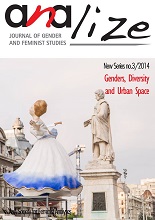Street Declined in Masculine: Sexualities, Real Estate Market and Masculinities in São Paulo Downtown (Brazil)
Street Declined in Masculine: Sexualities, Real Estate Market and Masculinities in São Paulo Downtown (Brazil)
Author(s): Bruno PuccinelliSubject(s): Gender Studies, Rural and urban sociology
Published by: Societatea de Analize Feministe AnA
Keywords: Gender;sexuality;urban space Brazil;
Summary/Abstract: This article addresses, theoretically, empirical data about the production of centers and peripheries in downtown São Paulo, taking as vectors gender and sexuality-based assumptions of differences. Such a thematic and epistemological approach comes from produced data which discusses the existence of a “gay street” in São Paulo: the Frei Caneca Street. Contrastingly, Repúbica region appears as carrier of a type of homosexuality less legitimate, poorer, darker, dirtier and sicker, and therefore, a less interesting masculine-feminized homosexuality. This article is based in two São Paulo city districts, located in the central region of São Paulo, República and Consolação. Such districts congregate most options for night leisure, shopping and meetings between homosexuals. A considerable amount of streets and sets of streets in this region are generically called “gay”, although the presence of identity-defined audiences is complex and variable. Their identities vary among lesbians, bisexuals, transvestites, transsexuals and queer people, and those who don’t have a well-marked identification. But what kind of space is gendered here? And how does this process impact space, city and people?
Journal: AnALize: Revista de studii feministe
- Issue Year: 2014
- Issue No: 3 (17)
- Page Range: 95-111
- Page Count: 17
- Language: English

